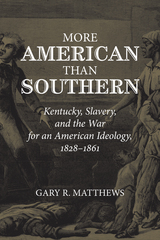
On the eve of the Civil War, Kentucky’s affinity for the South was based on historical and cultural similarities, including the presence of slavery and a powerful “master class.” However, the planter class that dominated early Kentucky was supplanted in the 1830s by an urban middle class that challenged both the need for slavery and the authority of the master class. Matthews analyzes the dichotomy of these two groups, examines emancipation efforts in Kentucky, and explores the intricacies of Whig politics to show how Kentucky differed from the “southern” model in significant ways. He also explains how geographical components, most importantly the southern Appalachian Mountains and the Ohio-Mississippi River system, helped define Kentucky’s singular role in antebellum America.
As Matthews shows, Kentuckians desired both Union and slavery, and saw secession as a threat to both. The state’s unique political and economic identities had been established long before the sectional crisis, and its self-interests could be best served in a national as opposed to a sectional environment. By choosing neutrality and then Unionism, the Kentucky of 1861 proved it was more American than southern.

This compelling ethnography explores the issue of cultural continuity and change as it has unfolded in the representative Guatemala Mayan town Santiago Atitlán. Drawing on multiple sources, Robert S. Carlsen argues that local Mayan culture survived the Spanish Conquest remarkably intact and continued to play a defining role for much of the following five centuries. He also shows how the twentieth-century consolidation of the Guatemalan state steadily eroded the capacity of the local Mayas to adapt to change and ultimately caused some factions to reject—even demonize—their own history and culture. At the same time, he explains how, after a decade of military occupation known as la violencia, Santiago Atitlán stood up in unity to the Guatemalan Army in 1990 and forced it to leave town.
This new edition looks at how Santiago Atitlán has fared since the expulsion of the army. Carlsen explains that, initially, there was hope that the renewed unity that had served the town so well would continue. He argues that such hopes have been undermined by multiple sources, often with bizarre outcomes. Among the factors he examines are the impact of transnational crime, particularly gangs with ties to Los Angeles; the rise of vigilantism and its relation to renewed religious factionalism; the related brutal murders of followers of the traditional Mayan religion; and the apocalyptic fervor underlying these events.

“As a guide to the late twentieth-century culture wars, Hartman is unrivalled. . . . Incisive portraits of individual players in the culture wars dramas. . . . Reading Hartman sometimes feels like debriefing with friends after a raucous night out, an experience punctuated by laughter, head-scratching, and moments of regret for the excesses involved.”—New Republic
READERS
Browse our collection.
PUBLISHERS
See BiblioVault's publisher services.
STUDENT SERVICES
Files for college accessibility offices.
UChicago Accessibility Resources
home | accessibility | search | about | contact us
BiblioVault ® 2001 - 2024
The University of Chicago Press









